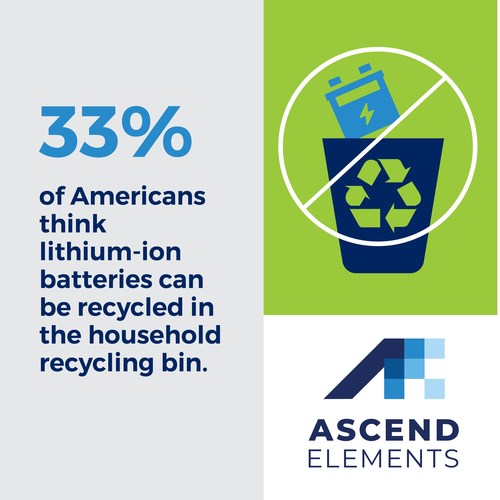Electric vehicle battery recycling is a booming industry – and the key to lowering the carbon footprint of EVs – but nearly half of Americans mistakenly believe lithium-ion EV batteries are destined for landfills
A new study has found that 47% of Americans believe that EV batteries cannot be recycled. The study, commissioned by engineered battery materials company Ascend Elements, also revealed that 37% of Americans don’t understand that recycled lithium-ion battery materials can be used to make new EV batteries, and only 39% of Americans understand that the critical materials in lithium-ion EV batteries can be recycled over and over without performance loss. The survey of 1,004 US consumers also revealed that 53% say their attitude towards EVs is more positive than it was three years ago, and 46% say electric vehicles will outsell petrol-powered cars in their lifetime.
- 46% say electric vehicles will outsell gasoline-powered cars in their lifetime.
- 59% say electric vehicles (EVs) are better for the environment than gas-powered cars.
- 59% say electric vehicles will save them money over the lifetime of the vehicle.
“We’ve encountered many myths and misconceptions about electric vehicles and, in particular, EV battery recycling,” said Roger Lin, VP of Marketing & Government Relations at Ascend Elements.
“The industry has made terrific advances in the efficiency and cost-effectiveness of lithium-ion battery recycling, but these false narratives about EV batteries continue. We are changing that by creating an infrastructure that would make it unthinkable to let a lithium-ion battery go to a landfill. They are just too valuable.”
Roger Lin, VP of Marketing & Government Relations at Ascend Elements.
The study also found that many myths and misconceptions remain about EVs, including potentially dangerous misunderstandings. For example, 33% of Americans mistakenly believe that lithium-ion batteries can be recycled in the household recycling bin, and 27% think it is acceptable to put used lithium-ion batteries in the household trash.
“For the record, lithium-ion batteries should never be put in the trash or the household recycling bin, but these survey responses help explain why we sometimes see fires and explosions in waste management facilities and recycling centers,” Lin said. “Used batteries should be dropped off at authorized collection points, many of which can be found at the big box hardware stores.”
He suggests checking the call2recycle.org website to find the nearest drop-off location.
Other notable survey findings include:
- 40% of US consumers say lithium-ion electric vehicle batteries aren’t really “greener” than internal combustion engines.
- 50% of US consumers say owning an EV means they’ll need to wait in long lines for charging stations.
- 53% of US consumers think EVs are more expensive to repair.
- 47% of US consumers think too many EVs will overwhelm the power grid.
- 41% of US consumers think electric vehicles are too small and slow compared to gas powered cars.
- 51% of US consumers say lithium-ion electric vehicle batteries don’t offer as much range as internal combustion engines.
- 54% of US consumers are concerned about what we will do with all these lithium-ion EV batteries after they reach end of life.
- 48% of US consumers think that EVs will cause toxic landfills full of old lithium-ion batteries.
- 40% of US consumers say the batteries in electric vehicles are more dangerous than the gasoline in internal combustion engine vehicles.
- 38% of US consumers think that lithium-ion electric vehicle batteries are sourced using destructive mining techniques.
- 45% of US consumers think the US isn’t competitive when it comes to manufacturing lithium-ion electric vehicle batteries.
Lin said the survey points to an industry-wide need for improved consumer education and outreach about lithium-ion batteries and EV battery recycling best practices. An executive summary of the survey results is available for download.
Battery recycling has been practiced for many years, but the recycling of EV batteries is a relatively new development. The first EV battery recycling facility was opened in 2012 by Umicore, a Belgian materials technology company. The facility, located in Belgium, was specifically designed to recycle the lithium-ion batteries used in EVs, and was the first of its kind in the world. Since then, the recycling of EV batteries has become increasingly important as the adoption of electric vehicles has grown, and more facilities have been built to handle the increasing demand for EV battery recycling services , including options for electric cars for sale in san diego.
About Ascend Elements
Based in Westborough, Mass., Ascend Elements is the leading provider of sustainable, closed-loop battery material solutions. From EV battery recycling to commercial-scale production of lithium-ion battery precursor (pCAM) and cathode active materials (CAM), Ascend Elements is revolutionizing the production of sustainable lithium-ion battery materials. Its Hydro-to-Cathode™ direct precursor synthesis technology produces new CAM from spent lithium-ion cells more efficiently than traditional methods, resulting in reduced cost, improved performance, and lowered GHG emissions. With fewer batteries going to landfill and a cleaner manufacturing process, Ascend Elements is taking the lithium-ion battery industry to a higher level of sustainability.
Story Source: Ascend Elements



